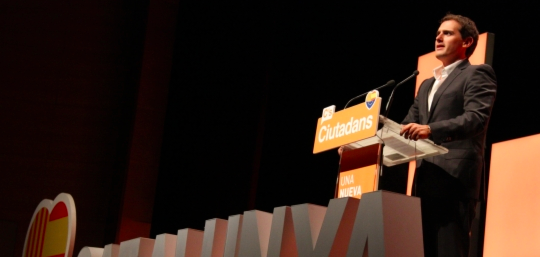14.10.2015 - 20:04
|
Actualització: 01.07.2016 - 10:47
The upcoming Spanish general election of 20 December could see the disappearance of the two-party system that has dominated Spanish politics in recent years. According to the latest polls, Ciudadanos is projected to be the third most-voted party, in the vicinity of the PP and PSOE and far ahead of Podemos. In January, polls predicted that Ciudadanos would obtain only 8% of the vote, and now this projection has jumped to more than 21%.
Ciudadanos has consolidated its presence in Spain very fast, particularly considering that until not too long ago the party only existed in Catalonia and has only recently expanded to the rest of Spain. Despite originating in Catalonia in 2005, Ciudadanos has always had a Spanish-centric identity and it has been characterized by its animosity toward Catalan nationalism and its opposition to Catalonia’s independence push.
In the Catalan parliament, where Ciudadanos has been represented since 2006, it has always been politically close to the PP. Particularly memorable was the scene both parties staged in 2013. As parliament was voting on a proposition calling for the condemnation of any activity that trivializes, exonerates, or denies Nazism, Francoism, or any dictatorships, members of both parties chose to abandon the room and abstain from voting.
In the Catalan parliament, where Ciudadanos has been represented since 2006, it has always been politically close to the PP.
Recently, both parties also withheld their support for a Barcelona City Council declaration calling on the Spanish government to declare null the court ruling that sentenced Lluís Companys to death. Companys, the president of the Catalan government, was apprehended in France in 1949 by the Gestapo and handed over to Franco authorities in Spain. Companys was executed by firing squad shortly thereafter. In 2010, France and Germany apologized for having collaborated in the detention of Companys. Spain, however, still refuses to condemn his assassination.
A right-wing party that calls itself liberal
Led by the Catalan politician Albert Rivera, Ciudadanos has always advanced right-wing policies, which it has tried to conceal under a liberal veneer. The party’s programme is aimed at strengthening the unity of Spain and attacking the decentralized political system of autonomous communities established in the 1978 Constitution. Not only Catalan nationalism has been targeted by Ciudadanos. Recently, Rivera suggested doing away with the advantageous fiscal arrangement enjoyed by the Basque Country and Navarra and implementing a single tax system centrally managed from Madrid.
Recently, Rivera suggested doing away with the advantageous fiscal arrangement enjoyed by the Basque Country and Navarra
But the aim of Ciudadanos extends beyond centralizing regional powers. Its attack on cultures other than the dominant, Spanish culture have been felt in Catalonia, Valencia, and the Basque Country. In this respect, Carolina Punset, the leader of Ciudadanos in Valencia, recently made a very controversial statement. In a speech, she defined Catalan as ‘an endearing language, but one that will not necessary help you find work’. She added that where Catalan is spoken, there is a regression to village life. This attack on the Catalan language was widely criticized from all cultural, academic and social sectors. The other political parties also weighed in on Punset’s comments, and even the PP called her statements ‘insulting’.
Ciudadanos’ overall media presence has grown on the back of its coverage in some of Spain’s privately-owned media. Thanks to this, in the local elections of last May, the party obtained good results and managed to successfully establish its presence in different communities.
In Madrid, for example, the support of Ciudadanos was decisive in allowing a beleaguered PP, mired in numerous corruption scandals, to remain in power. In Andalusia, it was the vote of Ciudadanos that finally enabled socialist Susana Diaz to be sworn in as president of the autonomous community. Ciudadanos lent its support in exchange for the socialists’ adoption of an anti-corruption pact. This agreement, however, fell apart shortly afterwards, as politicians who had been indicted for corruption were allowed into public office.
Many political analysts regard Ciudadanos as a media creation that is acting as a crutch that will allow the PP to stay in power for four more years, given the fact that, in all likelihood, it will not be able to renew the absolute majority it formerly enjoyed.
The following video, with almost two million visits, demystifies the phenomenon of Ciudadanos, casting doubt on the notion that it is a leftist project that is in touch with the people and whose aim is political regeneration, which is how the party describes itself:



